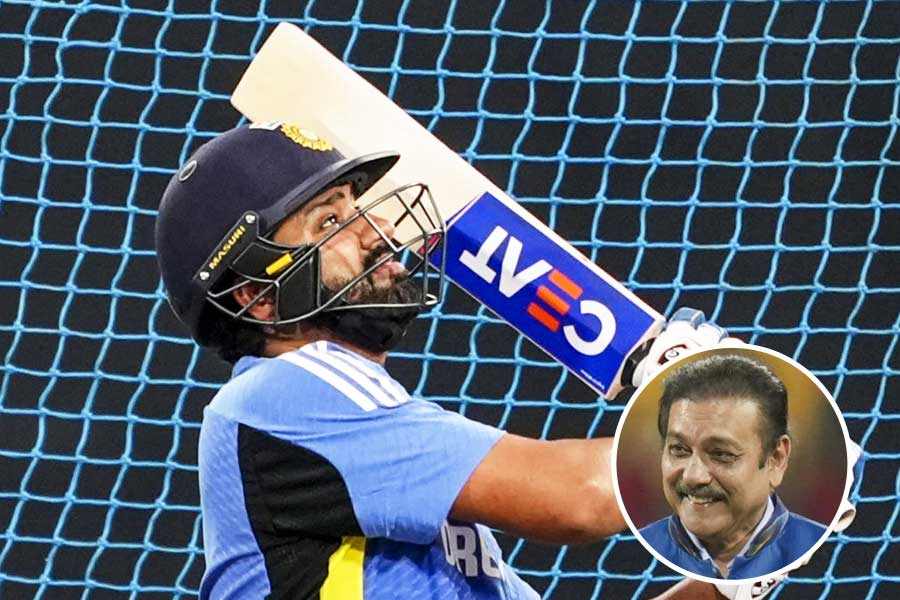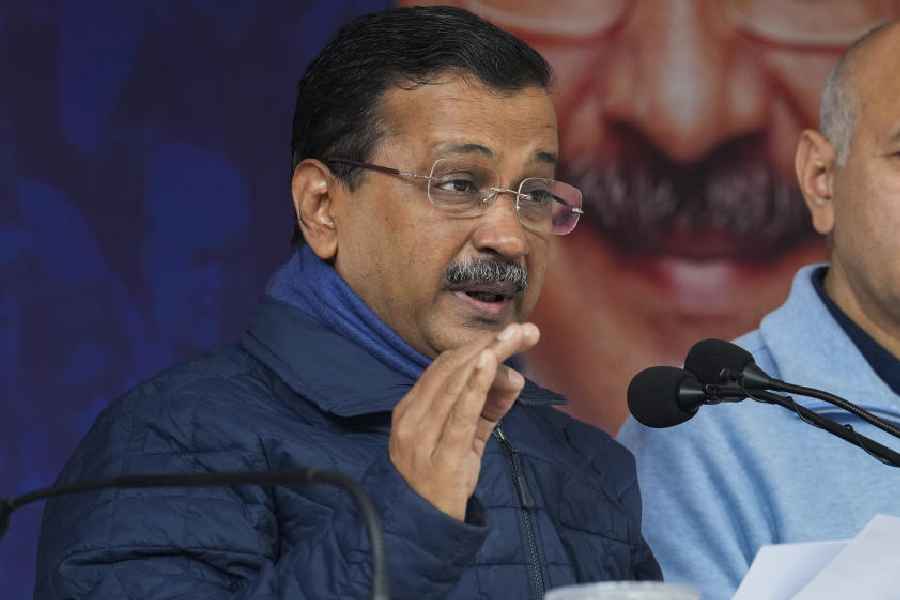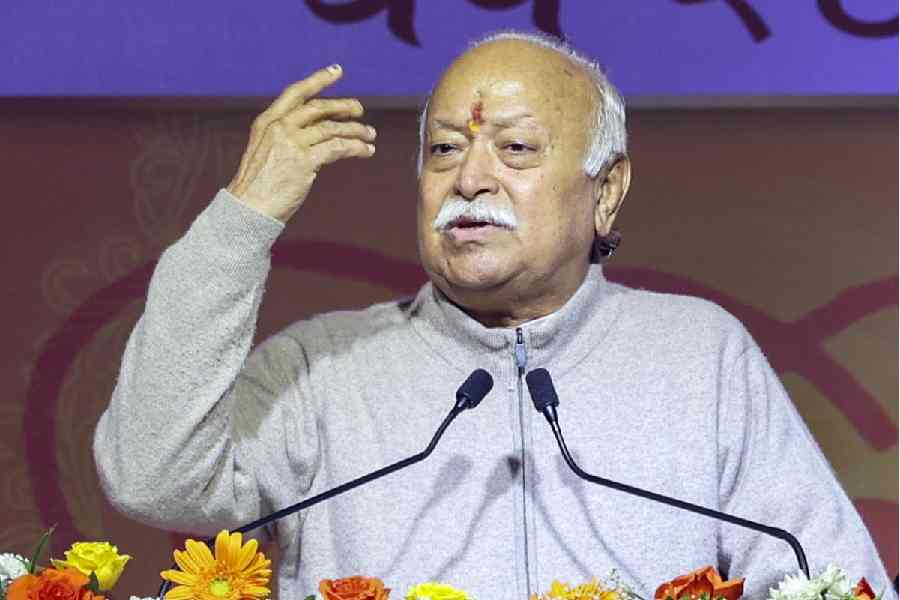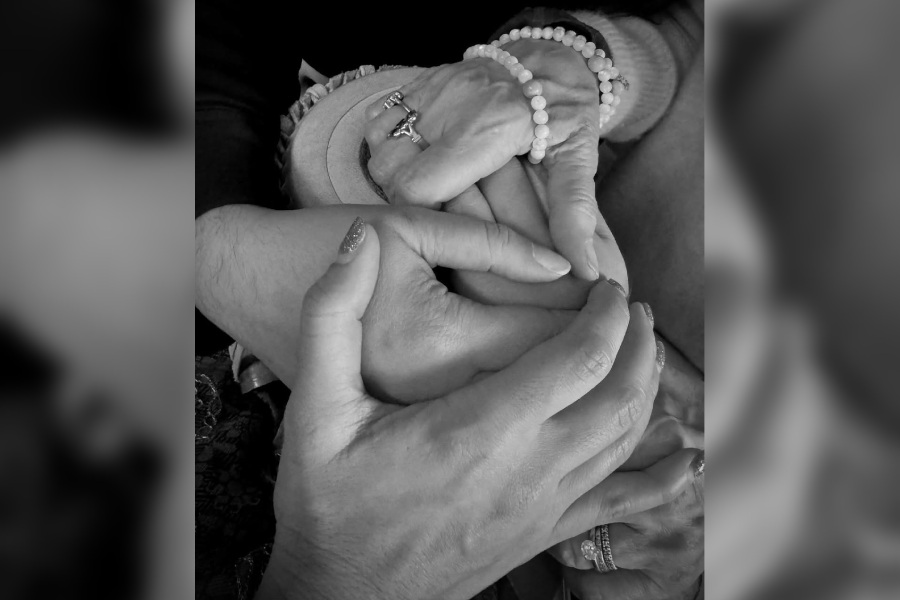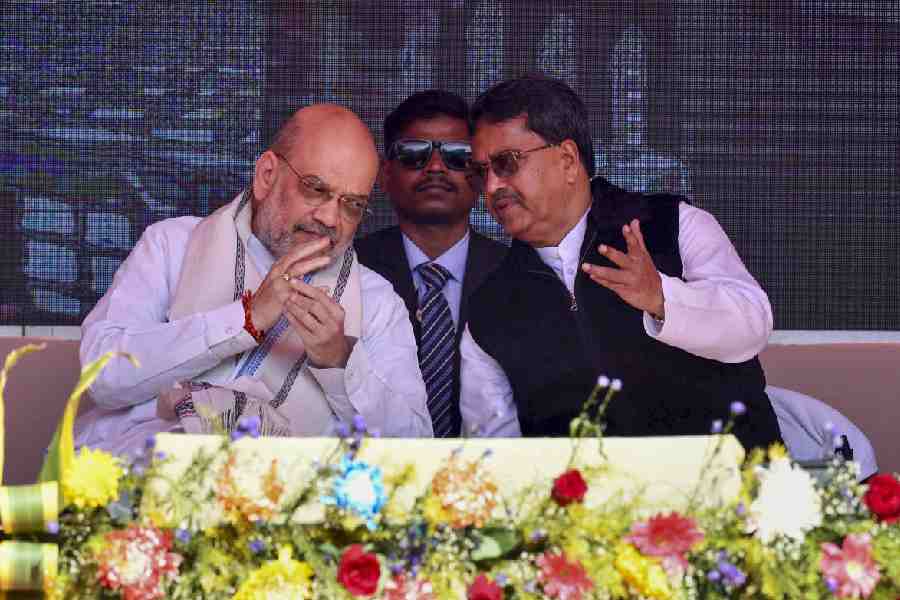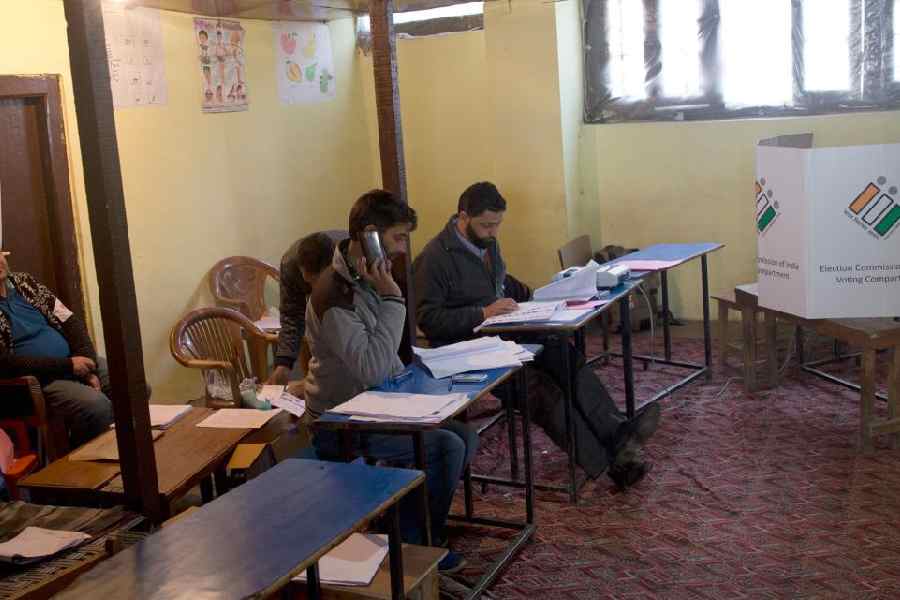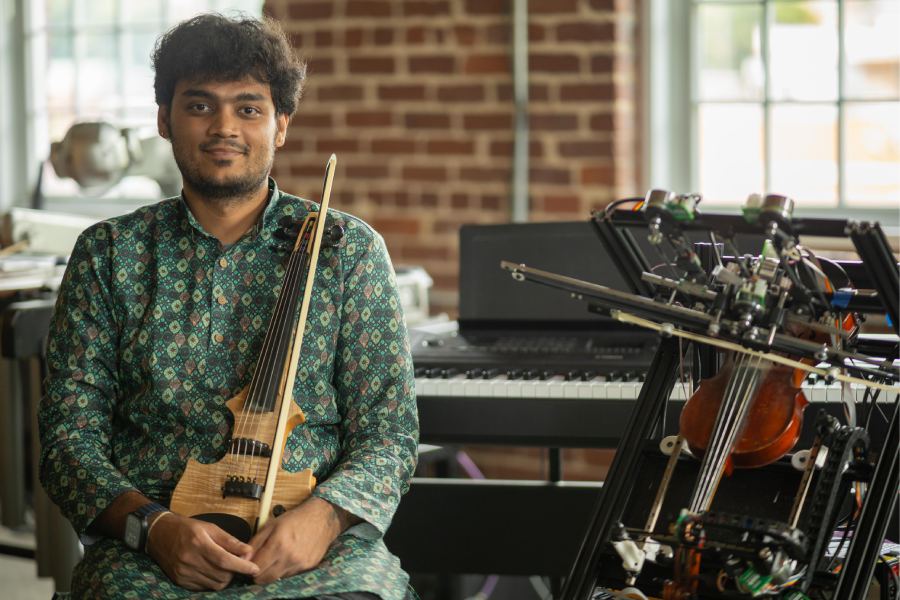Ranbir Kapoor, the scion of the Kapoor clan — indisputably the first family of Hindi cinema — was at the just-concluded International Film Festival of India (IFFI) in Goa. To mark Raj Kapoor’s centenary year, Ranbir chatted with eminent filmmaker Rahul Rawail about his grandfather’s legendary career as both actor and director, his enduring legacy and its impact on his own career. Excerpts.
Rahul Rawail: What has Raj Kapoor’s influence been on you? I know you were very young when he passed away...
Ranbir Kapoor: My earliest memories of him are of a big man with blue eyes. He used to hide caramel toffees in his fridge and he would make all the cousins — Kareena, Karisma, my sister (Riddhima) and I — stand in a queue, ask us to do salaam, sing and give him a kiss on his cheek... and then we were bribed with a caramel toffee.
My memories of him are very personal. I got to know him more after I started understanding movies, after I started understanding who he was, what his contribution (to cinema) was. I was his first grandson and I got a lot of love and attention. Whenever my mom (Neetu Kapoor) would shout at me, I would call him up. He would call up my mom and fire her. I used that as leverage!
He passed away when I was six and I have a vivid memory of that day. All of us kids were playing upstairs and when we looked down, we saw a sea of people. I had never seen so many people in my life! I understood that day: ‘Okay, this man has some standing, some value, he has done something. That is why so many people have come to pay him their respects’. That memory will always stay with me.
Rawail: As an actor, how do you interpret the themes he explored in his work?
Ranbir: Raj Kapoor, the filmmaker, always explored different themes at different times in his life. One of his earlier films, Awaara, which was based on casteism, tells you a story about how an individual and the surroundings that he is being brought up in impact the person he becomes. Shree 420 spoke about greed, about the underprivileged. The last few films he made spoke about society in an honest way but he still managed to make them commercial and really entertaining.
In Prem Rog, he spoke about the oppression of a woman in a patriarchal society. In Ram Teri Ganga Maili, he compared the protagonist Ganga to the river Ganga... how it starts so pure in the mountains but by the time it reaches below, because of society and human habits, it becomes impure.
He made Mera Naam Joker, which was a colossal disaster — he lost so much money and even his house was mortgaged — but he still had the courage to make a film (Bobby) with newcomers... a 50-year-old man making a film for the youth. He kept up with the times, he was not stuck in a cocoon, he was not sitting high up in his ivory tower.... He was constantly in touch with the common man and the kind of stories people wanted to see. To make a film like Bobby at that time, at the age of 50, which spoke to teenagers, is truly amazing.
Rawail: Which of his films has impacted you the most?
Ranbir: Two films come to mind. One is Shree 420... I love the story of a vagabond who has stars in his eyes, how he eventually makes it and how he deals with fame. That really spoke to me. I loved the music of the film, the performances, everything.
The second one is Jagte Raho. He didn’t direct it but he acted in and produced it. That film spoke to me, especially at a time when I was in film school. I was seeing films of different cultures, different countries. And when I saw Jagte Raho, I was like: ‘This should be up there with all the other films that we watch from all over the world, which are given accolades.’
Rawail: Your grandfather and father were both actor-directors. Any plans of becoming one?
Ranbir: I always wanted to be a director. I went to film school. I realised that the opportunities of being an actor came easily. I come from a privileged setting, so, of course, I had the opportunities. I didn’t want to take that for granted, I wanted to do my best.
The more I worked with good directors — and I have worked with a lot of good ones — I realised what a hard and selfless job direction is. Acting is tough too, but it is far easier than directing a movie. My grandfather directed, acted, produced, wrote, edited a film at the age of 24, which was Aag.
I am 42 today and I still don’t have the courage to direct a film. I produced a movie called Jagga Jasoos, which didn’t work at the box office. But it (filmmaking) is something which I have a burning ambition for. I am waiting for a story to come because one should make a movie only if he has a story to tell, not just for the sake of making a movie. When I was in film school, I made various short films that I have buried underground. Nobody will ever get to see them because they are so bad!
Rawail: Is there anything from Raj Kapoor’s way of making films that you would like to imbibe?
Ranbir: Raj Kapoor was Raj Kapoor because he didn’t follow a model. He took risks, constantly pushed the boundaries and told different stories of different characters. If you want to take any kind of legacy forward, you have to do it with a very individualistic approach.
When I started working in movies, my father was always against my choices. He always wondered what kind of movies I was doing. He said: ‘What is Barfi!, Wake Up Sid and Rocket Singh: Salesman of the Year?! You should do more commercial films and speak to a larger audience!’ But at that time, these films spoke to me and I surrendered to the parts in these movies.
Of course, we all are offshoots of movies of Raj Kapoor, Guru Dutt, Bimal Roy, Mehboob Khan and have taken so much inspiration from them. But it depends on how you use it. It depends on your perception of life, what you have absorbed as a person and then you want to just flow into that story and that is why it is different, it is individualistic. So yes, you can be heavily influenced but you need to be individualistic.
Rawail: Music was an integral part of his films. How has that impacted you?
Ranbir: He was very lucky to partner with genius talents. Shankar-Jaikishan, Hasrat Jaipuri and Shailendra were his close friends and for them, making music was not work, it was a passion. Their music sittings were like a way of partying for them. Raj Kapoor was a very learned man, whether it was music, literature or playing an instrument... it came very easy to him.
If you hear today’s music and you hear the music back then, there is so much of a difference in the poetry, in the writing, in the catchphrase of the song. Everything now has become reels. It is just a minute. You have a minute of a good stanza and that is enough. It is sad that music in Indian movies is kind of dying. I hope the music culture comes back and we celebrate music like he used to.
Rawail: Are you a foodie like your grandfather?
Ranbir: I am. But in today’s day and age, it has become an occupational hazard to stay fit. Cinema is a visual medium and you can’t let yourself loose. My mother always put it in our heads that we need to be healthy because the older members of our family had so many health problems. So I have taken more after my mom’s side. But not out of choice. It is just because I knew I had to be an actor.
The concept of a diet has not been known by my family, especially the generations before us. Once, Mr Prithviraj Kapoor (Ranbir’s great grandfather) had to be on a diet because he was about to start shooting for Mughal-E-Azam. He had his diet food and then he asked for some ‘real food’. His argument was that he had already had his diet meal and so no one could fault him on that!
FROM THE AUDIENCE
Since you have gone to film school, what is that one movie of Raj Kapoor that you think you could have directed in a different way?
Ranbir: I would have directed every film in a different way, but all of them would have been atrocious! I don’t believe in remakes. I believe a film is made to the best of its capabilities and you should not touch it, especially Raj Kapoor’s films. But I would love to have a go at Shree 420.
Your grandfather was a huge rage in Russia at a time when even subtitles didn’t exist. The music of his films is still popular there. How do you explain that?
Ranbir: Music touches everyone... you don’t need to know the language. It is an art form that touches the soul. The characters and the stories he made films about were universally appealing. Not just the Soviet Union... they were popular in Eastern Europe, the Middle East, Southeast Asia....
When I was a student in New York, I would wait for cab drivers who were from Russia or Ukraine because when they got to know that I was from the Kapoor family, they gave me a free ride! In my film school in New York, they would talk about (Krzysztof) Kieslowski and all other great filmmakers from around the world, but also mentioned Raj Kapoor and Guru Dutt.
What is a special memory attached to Raj Kapoor?
Ranbir: He had these massive parties in his Chembur home. Most people from the film industry would attend. The house had a big garden and once, while playing there with bare feet, I was bitten by a lot of red ants. This was in the middle of the night. My grandfather was in the middle of the party and was having a great time. But he picked me up, took me to his bathroom and started washing my feet. That is one moment I really remember.
Which film of yours would your father have really disliked?
I remember after he saw Barfi!, he told me: ‘Ranbir, you do good acting, but stop doing art films’. He called me the day before Rockstar released and asked: ‘Does the girl (played by Nargis Fakhri) come back or dies?!’ He was always fond of ‘complete films’.
When I was shooting my debut film Saawariya, he came to the set and started looking around and asked: ‘Why is this big Buddha head lying here? There are so many windows, where are the people? Why are you and Sonam (Kapoor) walking on the streets? Why is it night? When will it be day?’ I didn’t have any answers. I was like: ‘You are old-school now, this is really cool filmmaking!’ He sat in the car and told my mom that this movie was not going to work, that one cannot alienate one’s audience, that there has to be some relatability. I didn’t value what he said but I completely understand that now.
How do you explain the enduring popularity of your grandfather’s song Kisi ki mushkurahaton pe ho nisar?
Ranbir: The first song I made my daughter, Raha, listen to was this song. The lyrics are so simple and it is definitely a great philosophy to live your life by.
What does it feel like collaborating with Sanjay Leela Bhansali in Love & War, more than a decade after Saawariya?
Ranbir: I am extremely excited. He is my godfather. Everything I know about films and about acting is from him. Working with him again after 17 years, it still feels the same. I am in awe of him. He hasn’t changed at all. He is extremely hardworking, all he thinks about is his movies.
If you had to pick one film of yours for Raj Kapoor to direct with his vision, which one would it be?
Ranbir: He made Bobby, and he was always amazing at making love stories. Yeh Jawaani Hai Deewani is that one film where I feel he would really celebrate the characters and the music.


